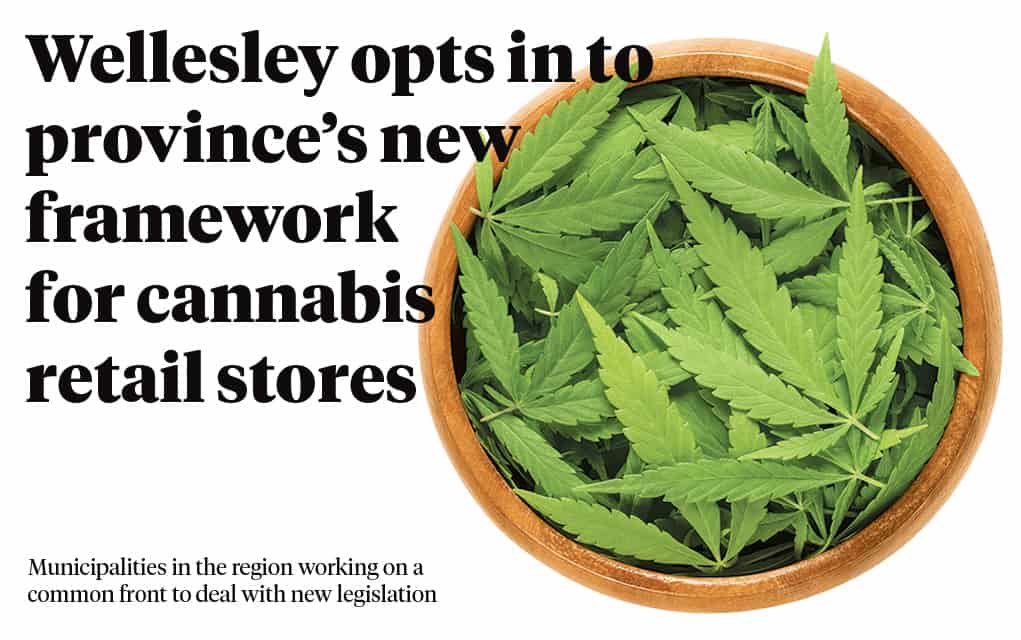While Wellesley is unlikely to see any pot dispensaries in the foreseeable future, the township will opt-in to the province’s new plan for retail cannabis shops.
The decision by Wellesley council Tuesday night is part of a region-wide strategy to deal with the legalization of recreational marijuana and the new Cannabis Licence Act. Woolwich is expected to deal with the issue at a council meeting January 15.
Under the provincial guidelines, municipalities have until January 22 to opt-in (permit) or opt-out (prohibit) regarding the inclusion of cannabis stores, with 25 locations across Ontario slated for retail outlets, seven of which are to be allotted for the western part of the province. In what is described as a “cannabis lottery,” the first round of applicants to be given licenses will be picked randomly on Friday.
The province is looking for the first private cannabis retail outlets to open April 1.
In making a decision this week, Wellesley councillors got the advice of Waterloo Regional Police chief Bryan Larkin, who recommended that the township opt-in.
“We’ve always supported regulated control and regulated sales,” said Larkin. “And retails stores, as well as what they bring to a community. Because we also have to move past the morality or the individuality perspective around cannabis – it’s legal. It’s very similar to alcohol, and gambling, etc. But regulated control and regulated sales ensure that there’s a protection.”
The region has coordinated efforts among the seven lower-tier municipalities to avoid a patchwork situation where some areas ban the stores while others allow it. Opting in allows the police to focus on other drug-related issues while combating the grey market and illegal dispensaries, said Larkin.
“It also allows the police service to focus on, quite frankly, more important sale and traffic in illicit drugs. I don’t think it’s any secret that we continue to face a significant challenge with opioids across our region. Particularly in the urban centres, but the townships are not immune to the challenges of opioids.”
It is highly unlikely that Wellesley will be one of the locations selected for a retail store, given its comparably smaller size, but Mayor Joe Nowak was supportive of the movement to opt-in.
“We don’t have these legal dispensaries, but we’ve had a number of grow-ops in our community over the past five to ten years – there are three that I can think of,” said Nowak, noting that opting out would force growers out of the township. “They’re not going to be profitable then.
“I think the likelihood of Township of Wellesley getting a dispensary store in the next 5-10 is pretty slim.”
The Alcohol and Gaming Commission of Ontario will regulate these outlets. While the final decision was met with no contention from council, Kitchener-Conestoga MP Harold Albrecht is vocal about his opposition on the topic.
“It is my sincere hope that in the interest of the well-being of our youth and the health of our communities in Kitchener Conestoga, that all our municipalities will reject the idea of retail outlets,” said Albrecht in an email to the Observer. “It is too early to measure the impact on individual communities; however, the long term negative impacts will be realized in terms of public safety on our roads and in our workplaces.”
Road safety is a concern, with no reliable way to test if a driver is impaired from marijuana. To check if a driver is impaired, the police force must use drug recognition experts which is a sizeable financial implication, he argued.
“I’ve heard from several police officers from our region and throughout Canada that they do not feel they have adequate resources to keep Canadians safe on the roads,” said Albrecht.
The province has allocated a minimum of $40 million to be distributed to municipalities throughout the next two years to aid in the transition of rolling out these retail stores. In early January, the first payment of $15 million will be distributed by the Ministry of Finance on a per-household basis. The Township of Wellesley is slated to receive $5,000 in the first instalment, while a second payment will be distributed following the January 22 deadline.









